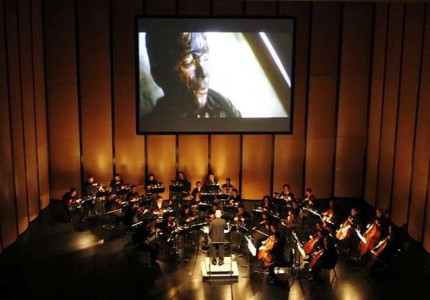Fulcrum Point’s “Inner Torments” merely skims surface of multi-media misery

On paper at least, it was an interesting idea: spotlighting ways in which music has been used in films to express human suffering. As an actual concert experience with film excerpts, however, Fulcrum Point New Music Project’s ninety-minute season-opening program “Inner Torments” Thursday night at the Harris Theater was often ineffective in conveying either the essence of the music or the accompanying films in their best light.
For starters, film excerpts shown often contained the original soundtrack — including the pre-recorded music — which meant that the live ensemble was sometimes put in the position of having to compete with a canned performance of other performers alongside of itself. This made synchronization a constant challenge, forcing the inevitably straightjacketed live musicians to play somewhat stiffly and without freedom.
(Symphony Center obtains film prints that have removed the music track but left in dialogue and sound effects for its similarly-conceived “Friday Night at the Movies” series, although the problem still remains of having to match up the music cues to the precise points in the film, which also remained an issue for Fulcrum Point all evening, even when the film soundtrack itself was silenced.)
And since some of these were, after all, only film excerpts, any audience members who hadn’t seen the original films were left with the baggage of being do-it-yourself filmmakers and imaging how these excerpts might form a coherent narrative whole and how “inner torment” might be expressed as a result.
In The Reader excerpts for instance, we see a lot of scenes of an expressionless young man walking around looking rather vacuous, making love, and later, walking slowly through a concentration camp without emotion. That even an abandoned concentration camp means suffering is clear, but the accompanying music — Nico Muhly’s schmaltzy, swirling Minimalism punctuated with suspense cues — hardly qualifies as angst, except perhaps for those who may be allergic to repetitive arpeggios.
The 1999 short subject GRAB IT! with an “avant pop” score by Dutch composer Jacob ter Veldhuis — who uses the aka JacobTV — makes use of the tape loop idea that Steve Reich pioneered back in the mid-1960s where bits of speech with a musical cadence to them are repeated rapid-fire and subjected to transformations.
In this case, the dialogue is full of the “f-bomb,” as Fulcrum Point founder and artistic director Stephen Burns warned in his spoken introduction, and represents urban gamblers in their quest for a jackpot.
The score weaves around the casino images and dialogue and spotlights abrupt bursts of musical energy conveyed by saxophone, electric bass and drums that do successfully manage to reflect the thrill and energy of gambling although at least in this presentation, the romance rather than the toll takes precedence.
Holding Fast, a 2007 short conceived around music by Fulcrum Point Music Alive composer-in-residence Randall Woolf, is a look at refugee life around a Tibetan refuge camp on the other side of the Himalayas in northern India. With its images and sounds of people praying, singing and children playing, fails to convey the theme of suffering, although perhaps the ambient violin weaving in and out of the proceedings is meant to convey that.
Bartók’s Music for Strings, Percussion and Celesta closed the evening, under the premise that some of it had been used for a scene in Being John Malkovich even though its use in Stanley Kubrick’s The Shining would have probably been more in line with the overall theme of the concert.
The entire four-movement work was performed, albeit with a mere thirteen string players, yet surprisingly, it worked quite well. Yes, some of the rich sonority of the piece was sacrificed, but its structure and transparency were preserved. A couple of movements featured some scenes from the film, but this listener quickly did his best to ignore them, as looking at repeated images of John Malkovich served neither him nor Bartók’s wonder-filled score.
By the end, whether a technical glitch or by design, the film excerpts had run out and there was merely the static title card for the film suspended over the stage, blessedly giving Bartók the last word.
Posted in Performances




